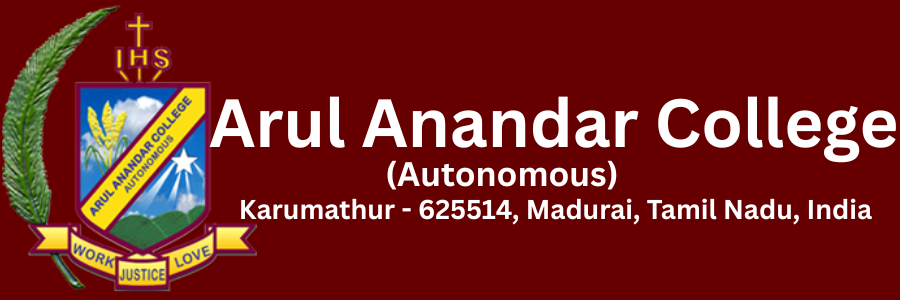- Home
- About us
- Administration
- Academics
- Research
- Student Support
- Outreach
- Alumni
- Admissions
- AAC Portal
- Contact

Objectives

The National Policy on Education (1985) visualises that education should become dynamic as never before. Arul Anandar College (AAC) possesses all the features of the programme as well as strategies to impart the necessary dynamism to rural higher education. Thus the evolution and the development of AAC, with its preferential option for the poor, the MBC and the dalits, centres around the maintenance of proper standards. This objective is achieved by ensuring optimum utilisation of facilities, promoting innovation and change, relating education to emerging occupational patterns, and offering viability and equalization of educational opportunities for the weaker sections of the society, particularly the MBC and the Scheduled Castes, who form the majority of the student population of this institution.
It must be pointed out, however, that the work of AAC as an agent of social change is not merely the change of behaviour and the acceptance of new values for living, so that individuals cease to be unjust, but also the transformation of an unjust society. Mere reform of existing structures is inadequate to remove the causes of injustice; hence the change of structures is necessary. Hence the option for the poor is an option for a just, free, fraternal and non-exploitative society, in which persons and communities find their human fulfilment. There is every reason to believe that the poor and the oppressed as victims of the present exploitative system will be the creators of a new just society. The option for the poor and the dalits in this context is an option to work for the awakening of the poor masses and to join in their struggles for a just social order.
AAC, managed by the Jesuits of the Jesuit Madurai Province, is a minority institution. As such, it enjoys all the privileges and rights of the minorities enshrined in the Constitution of India and implemented by the Government of Tamil Nadu. It aims, in particular, at raising the standards of education and of living in area that is classified as the most backward area, and for this purpose the Department of Rural Development Science has been established. Conscious of the dire poverty of the masses and the prevailing moral and spiritual degeneration and social inequalities that beset our country, the management of the college gives important place to moral and spiritual values and desires to inculcate a strong sense of social justice in the students, hoping to make the institution, both in theory and practice, an agent of social transformation and move towards a just and equitable social order. To further the process of empowerment of women the Jesuit management has also opened the doors of this institution to women students at U.G. level from 2001 onwards and in June 2005 a women's hostel was established.
Thus, this institution stands poised for the formation of the whole person, religiously oriented, morally upright, intellectually alert, socially conscious and committed and nationally concerned.